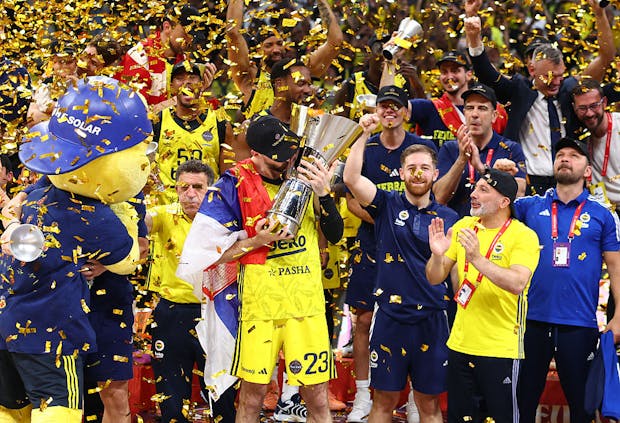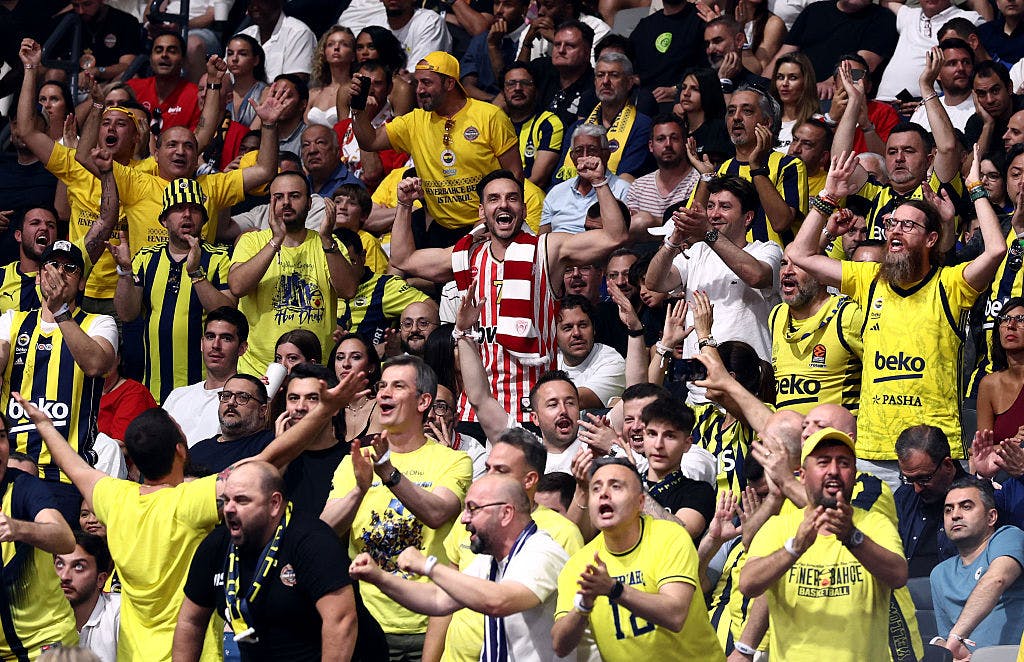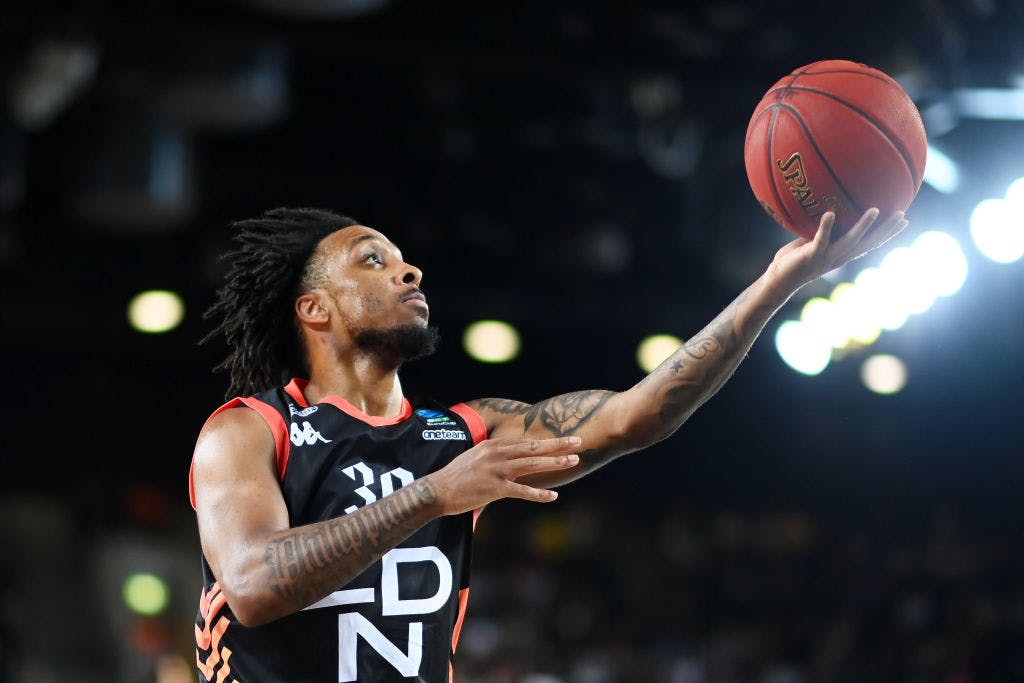
As it celebrates its 25th birthday, Euroleague Basketball finds itself, temporarily at least, in defensive mode.
With a high-profile, highly-financed threat from the west reportedly coming in the shape of the National Basketball Association, Euroleague Basketball is in no mood to cede court territory.
The commercial picture, however, looks bright – annual revenues are in line to hit around €125m ($142m) for 2025-26, a joint venture with IMG is in place for another decade and a first move into the lucrative Middle East region has been deemed a success.
Now, Euroleague Basketball is preparing to pivot, and meet the NBA threat with aggressive expansion plans of its own. Last weekend’s showpiece EuroLeague Final Four in Abu Dhabi was the first demonstrative example.
Tickets for both semi-finals, the third-fourth placed play-off and Sunday’s final sold out in less than seven hours. And it wasn’t just locals eager to get a glimpse of the latest party in town. Only around 10 per cent of attendees across the weekend’s fixtures were Abu Dhabi residents. Thousands of fans of Fenerbahce, Olympiakos and Panathinaikos — and significantly fewer from Monaco — flocked to the 18,000-seat Etihad Arena, driving tourism spend.
It reportedly cost the Abu Dhabi Department of Culture and Tourism (DTC) €20m to take the Final Four outside of Europe for the first time. It will be back too, twice more in fact, most likely in 2027 and 2029 with the hosting contract stipulating three events over a five-year period.
Serbian executive Dejan Bodiroga, a former player and now president of Euroleague Basketball, called this year’s Final Four, won by Fenerbahce, the most significant moment in the organisation’s history.
“We must protect what makes European basketball special,” he told an opening media conference. “We are strong, we have the best fans, the most exciting games, and now we want to grow and evolve. Being in Abu Dhabi is an example of that.”
Driving that evolution on a daily basis is Euroleague Basketball CEO Paulius Motiejunas.
He says: “I truly believe we have the best product on the court. Now it’s about how we exploit it. We are continuously growing. This season was the best yet, and we keep growing. Fans and teams push us forward. The value lies in our product, the fans and the arenas.
“We’ve built something that’s hard to copy or recreate.”
We’ve built something that’s hard to copy or recreate.
Paulius Motiejunas, CEO, Euroleague Basketball
That last line hangs in the air.
NBA commissioner Adam Silver is not quite ‘persona non grata’ around Euroleague Basketball quarters, but there is a wide dissatisfaction with how the US league has looked to impose itself on the European basketball landscape.
One Euroleague Basketball stakeholder told SportBusiness: “We believe in collaboration. Let’s use your strengths and our strengths and see how we can improve and grow European basketball together. But if you host a press conference where you say, ‘we’re coming to Europe’. And then you say, ‘oh, but we’re ready to cooperate’, that’s not the way to do it.”
In late March, Silver announced the NBA’s plans to explore a new professional league in Europe alongside the International Basketball Federation (Fiba). The league, which would launch in 2027 at the earliest, could feature 16 teams, 12 of which would be permanent members. Such a format would leave space for four franchises to enter the competition through a merit-based system.
The NBA has been in talks with Fiba for over a year about developing the sport in Europe, with the league having hired boutique investment bank Raine Group to assess its opportunities in Europe.
The potential of an NBA Europe league would see Euroleague Basketball and IMG face the prospect of stiffer competition than that currently offered by Fiba’s Basketball Champions League (BCL).
Talks between the NBA and Euroleague Basketball did take place, yet it is unknown how close, if at all, the two parties got to discussing terms over any potential collaboration.
Reports coming out of some of the 12 current EuroLeague stakeholder clubs (CSKA Moscow’s licence is suspended due to the invasion of Ukraine) claim the offer from the NBA was unsatisfactory.
Adam Kelly, IMG president, says: “They [the NBA] have said on record that their belief is you should clean up the landscape in Europe and have a premium basketball competition, and a secondary basketball competition, with 16 teams, primarily fixed membership and some adjustments of teams coming in and out. When they described that I was pleasantly surprised, because it sounds exactly like EuroLeague. So, it sounds like we have been doing the right thing all this time.
“The NBA should not be running a separate competition if we wants to drive the growth of basketball. For basketball to be ever more successful it needs to be very clear, very straightforward for all the brands, broadcasters, channels, and most importantly for the fans. What is the best basketball to watch in Europe? There’s absolutely no doubt today that’s EuroLeague. We expect that to continue.
“How could we further enhance it? That would be Euroeague, Fiba and the NBA all finding a pathway where there was just one voice, one message and one set of competitions. Now, unfortunately, the world is not as simple as just everybody getting around a table and holding hands and agreeing something.
“There are a few steps in my mind on how to get there. I think it’s possible but it means compromise across every part of the ecosystem and the challenge is, are people prepared to reach those compromises?”
New markets, new teams?
Until the NBA moves on from “exploring opportunities” to enacting an actual business plan, Euroleague Basketball wants the focus to be on itself.
Staging the Final Four in Abu Dhabi was not without controversy, yet Euroleague Basketball is well aware that if you talk the talk of the Middle East being a key growth market for your league, you have to be willing to walk the walk.
A healthy hosting fee will no doubt have softened the stance of naysayers, but Kelly says there’s a wider perception story at play.
“The best sports in the world have been coming to Abu Dhabi now for a number of years, and suddenly you put EuroLeague into that bracket,” he explains. “That’s what’s been so important about the rationale for coming here: we’re putting EuroLeague into that super premium small group of elite properties.
“I’ve been very confident from the beginning that this will be the best basketball ever showcased in Abu Dhabi and if you put the events of the weekend side-by-side against any other basketball, you’re going to see how incredibly strong EuroLeague looks in that light. It’s a challenge for anyone to do something new.”

And it’s not just geographic expansion. A bigger EuroLeague is coming from the 2025-26 season when the league will move from 18 to 20 teams, sticking with the current round robin format. A bigger 24-team competition has not been ruled out further down the line, which will likely bring a move to a conference system.
The only known changes for 2025-26 is that Alba Berlin is out — it has jumped ship to Fiba’s BCL — while Hapoel Tel Aviv, winners of this year’s second-tier EuroCup, is in.
Yesterday’s (Thursday’s) board meeting of Euroleague Commercial Assets, the entity that owns EuroLeague and EuroCup, approved a proposed expansion to 20 teams, which must still be ratified by the general assembly. The board said it will present a preliminary list of proposed participating teams in due course for consideration. There is known to be plenty of appetite.
Expansion could see a return for Valencia, relegated to the EuroCup last year, and a debut for Dubai BC, which has been making inroads into European basketball since joining the Balkans’ Adriatic ABA League last year.
Parachuting in a United Arab Emirates-based team has been under discussion for a few years, with the Final Four hosting deal seen as a way to take the temperature of top stakeholder clubs.
Motiejunas, who spent most of his career in various capacities with Lithuanian club Zalgiris Kaunas, says of Dubai’s prospects: “We have the Final Four in this market, and it’s one of the options… It’s provocative, because nobody wants to have a strong competitor, a new market competitor. Of course we need new markets… It’s a discussion. There are pros and cons, and eventually still the teams decide. If there are more pros, then I will say everybody is in favour, if there are more cons then we would say they’re not united. The teams eventually still approve the participants for the next season.”
While the teams decide, Euroleague Basketball does lean on IMG for advice on which markets to tap from a commercial point of view.
“We always ask them for advice, to put the numbers behind our emotions and calendar,” Motiejunas adds. “We want this cooperation to be more hand-in-hand because we have a strong partner which I believe we did not use well enough in the past. Now, we’re changing this. So, with the Final Four location, and it’s the same with the calculation on number of teams, IMG advises how it’s better for us financially, how we can grow and which markets to go to, but they’re not involved in the decision-making. That is the clubs.”
Into the Lions cage
Closer to home, Euroleague Basketball has been buoyed by the success of Paris Basketball, which has been cultivated as a EuroLeague team ever since its formation in 2018, given the commercial potential. Paris made its top-flight debut this year, following victory in the EuroCup in 2024, and was a success, making the play-offs only to lose to eventual winners Fenerbahce.
A similar long-term watchful approach is being taken to London.
The city’s London Lions team had made strong advances in recent years, reaching the semi-finals of the EuroCup in 2023-24 (losing to Paris). However, the bankruptcy of team owner 777 Partners halted its progress and saw the team kicked out of this season’s EuroCup due to financial instability.
New owners Tesonet – a Lithuanian tech company and minority shareholder of EuroLeague club Žalgiris Kaunas – are rebuilding the Lions but in a far steadier fashion than 777 attempted.
Discussions with the Lions are not helped by the uncertainty surrounding professional basketball in the UK, where GBBL has been awarded a 15-year licence to operate a league by the British Basketball Federation (BBF), rivalling the existing Super League Basketball.
Motiejunas says: “This is an internal fight and we’re not involved in that. We’re talking to the club [Lions], they’re making the right steps… We have them and we have reached out to others, but there’s still too much uncertainty, so London would be the first step and we’re hoping that if everything goes ok, they will apply for EuroCup and we will analyse them as a potential spot.”

Kelly adds: “It’s a good example of how challenging it is to launch a new team in any sport. But basketball can barely sustain one league in the UK, and there seems to be two trying to launch. London Lions have clearly been the outstanding candidate to find a pathway into EuroLeague. Paulius and the organisation has been very clear that you can’t just jump straight into EuroLeague. It’s very challenging to get to the right level. So, London Lions, that’s hopefully a prospect for the future, but they still have a lot of work to do.
“When you look at some of the other conversations going around, just launching new basketball teams in jurisdictions where you’d like to dream up a cast of cities around the world, well it’s a lot harder than people imagine.”
Another line, given the current geopolitics in basketball, that hangs in the air.